Key takeaways:
- Ethical advertising builds long-term consumer trust and brand loyalty through transparency, authenticity, and aligning with consumer values.
- Transparency fosters consumer confidence and enhances brand credibility, encouraging ethical competition and reducing misunderstandings.
- Brands can overcome challenges in ethical marketing by prioritizing relationships over profit, engaging with consumers, and ensuring alignment between their values and actions.
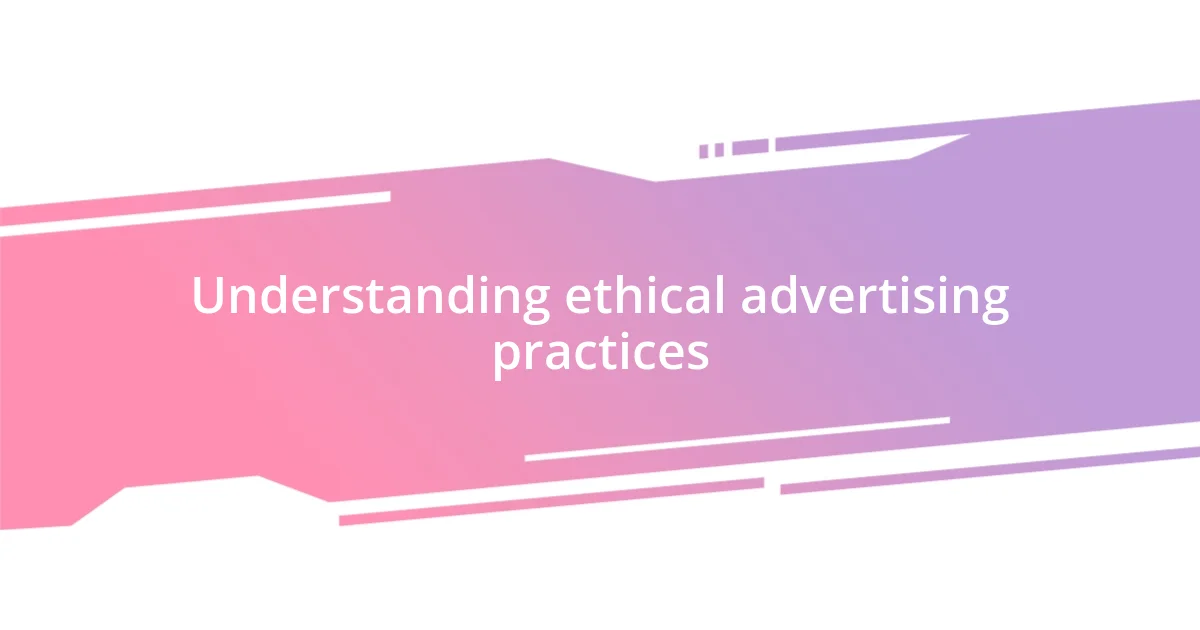
Understanding ethical advertising practices
Understanding ethical advertising practices involves navigating a landscape where truth, integrity, and respect for the consumer reign supreme. I’ve realized that businesses often toe the line between persuasion and manipulation, which can muddy the waters. When I first encountered a misleading ad, it left me feeling frustrated—why would brands choose to mislead rather than build trust?
In my experience, ethical advertising doesn’t just benefit consumers; it also enhances the brand’s reputation in the long run. Take, for instance, a campaign I once saw that transparently shared its sourcing and production processes. I felt a genuine connection with that brand, and it made me wonder: isn’t it refreshing when companies prioritize honesty over sheer profitability?
Moreover, the emotional aspect of ethical advertising can’t be overlooked. When a brand has a clear stance on social issues, I find myself more inclined to support them. It sparks a question in my mind: doesn’t it feel empowering to engage with brands that align with our values? This connection transforms mere consumers into passionate advocates.
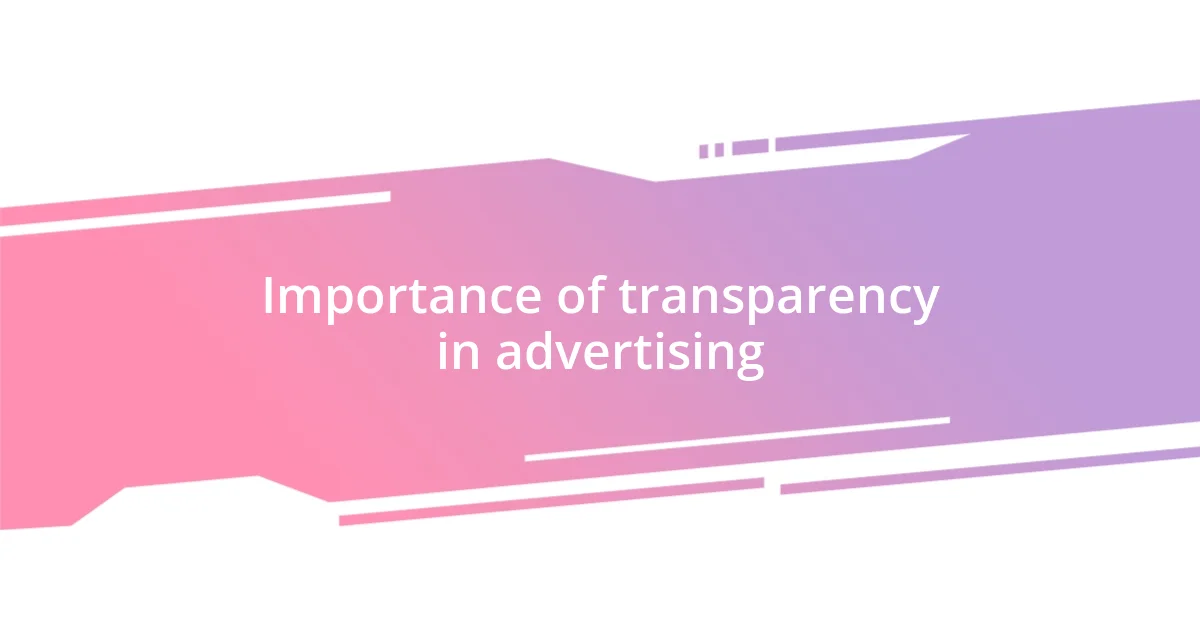
Importance of transparency in advertising
Transparency in advertising is vital for fostering trust between brands and consumers. When I see a brand openly sharing their product ingredients or sourcing methods, I can’t help but feel a sense of respect. It reminds me of that time I discovered a skincare brand that listed every ingredient and its purpose. I appreciated their honesty so much that I became a loyal customer, and that’s the beauty of transparency—it cultivates loyalty.
Consider the following reasons why transparency matters in advertising:
- Builds consumer trust: When consumers understand what they’re buying, they’re more likely to feel confident in their choices.
- Enhances brand credibility: Brands that practice transparency often enjoy a positive reputation, leading to increased recommendations.
- Reduces negative surprises: Clear information helps prevent misunderstandings about products, ensuring that customer expectations are met.
- Encourages ethical competition: Transparency pushes companies to uphold high standards rather than cut corners, fostering a healthier marketplace.
It’s those little moments of transparency that make all the difference in my purchasing decisions. I often find myself gravitating towards brands that openly communicate their practices—it feels good to support those who care.
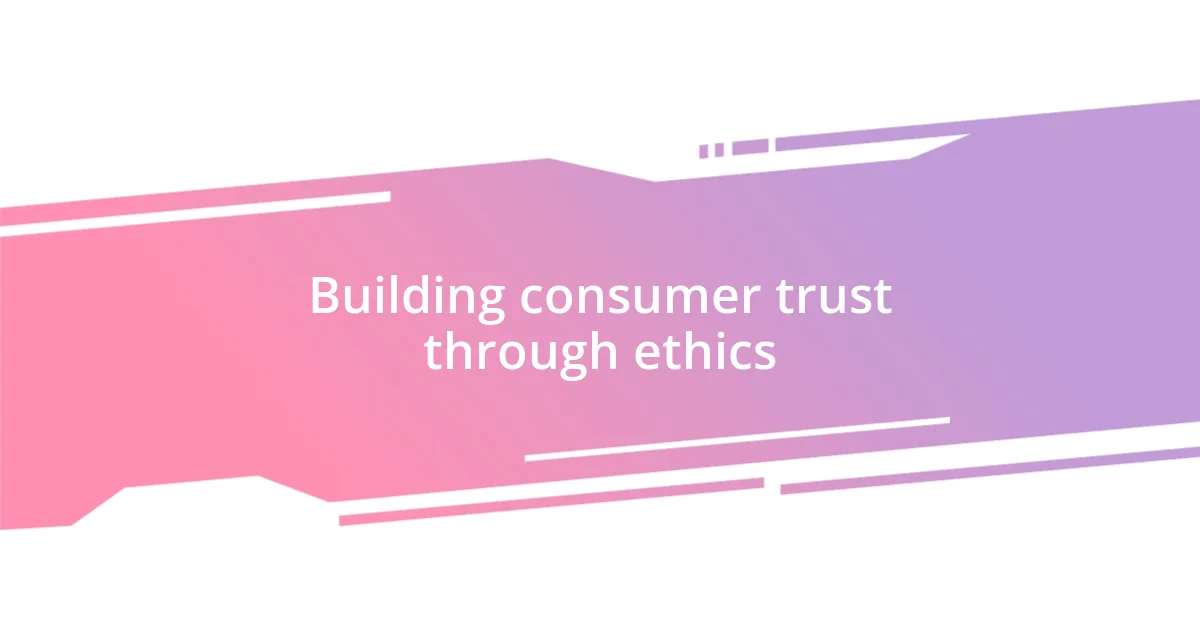
Building consumer trust through ethics
Building consumer trust is fundamentally rooted in ethical practices. From my own experience, I’ve noticed that brands that prioritize ethics often cultivate a loyal customer base. For example, when I purchased from a company that highlighted its commitment to sustainability, I felt like my values were aligned with theirs. It wasn’t just about the product; it was about investing in a vision that resonated with who I am.
I’ve seen how authenticity in advertising makes all the difference. I vividly recall a food brand that shared stories of their farmers and their ethical sourcing methods. This personal connection transformed my perception of the brand. I didn’t just see labels; I saw people and their hard work, which deepened my trust and made me more likely to choose their products over competitors. It’s fascinating how personal narratives can create such strong ties between consumers and brands, isn’t it?
Moreover, I believe that ethical advertising sets a standard for the market. When brands demonstrate a commitment to ethical practices, it encourages others to follow suit. I often find myself questioning what other brands are doing when I encounter a transparent company. It’s like a ripple effect; one brand’s ethical stance can inspire a whole community to engage better with consumers. How transformative is it to think that our buying choices can influence industry standards?
| Trust-Building Factor | Impact on Consumers |
|---|---|
| Transparency | Encourages informed decisions and fosters loyalty |
| Authenticity | Creates emotional connections and enhances brand perception |
| Commitment to ethics | Inspires confidence and attracts socially-conscious consumers |
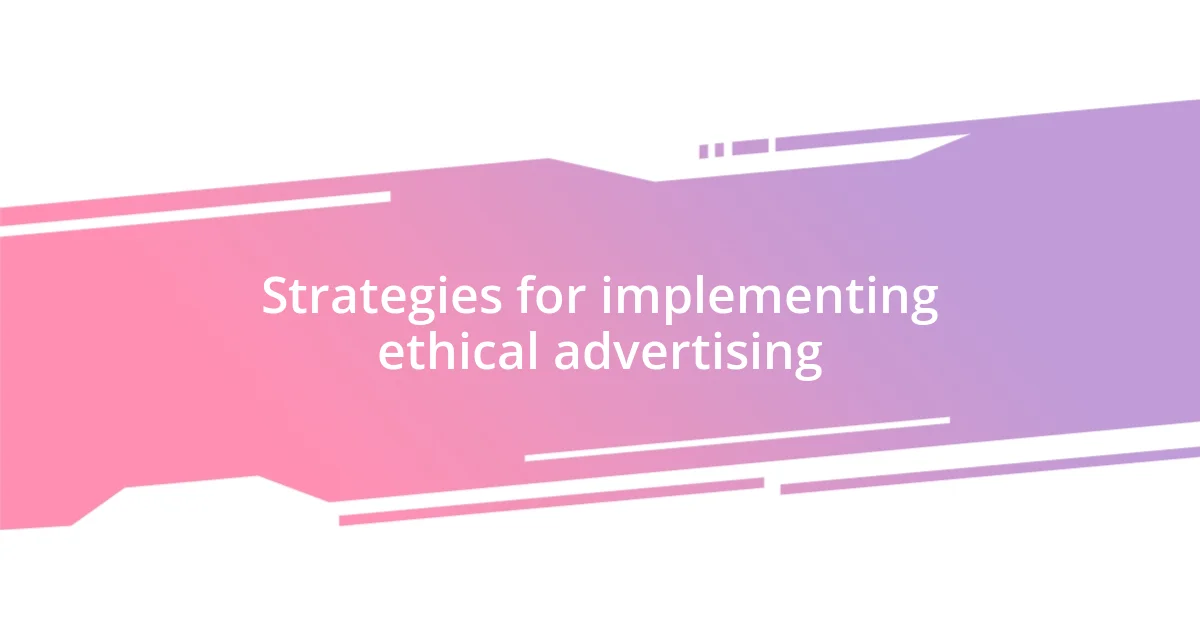
Strategies for implementing ethical advertising
When it comes to implementing ethical advertising, I’ve found that integrating storytelling is incredibly effective. For instance, I stumbled upon a beverage company that not only shared their sourcing practices but also told heartfelt stories about the communities behind their products. This approach made their ads feel less like marketing and more like a genuine invitation to join their journey. Isn’t it refreshing to see brands invite us into their narratives rather than just pushing a sale?
Another strategy I’ve come to appreciate is engaging directly with consumers about their values. I remember when a clothing brand asked its audience to participate in a campaign focused on sustainability. They invited feedback and even showcased customer stories in their advertisements. It felt empowering to know my voice mattered. This kind of two-way communication creates an authentic dialogue that strengthens both trust and loyalty. Can you imagine how much more engaged we would all feel if brands included us in their conversations?
Lastly, I think it’s paramount that companies practice accountability. I recall a tech firm that publicly acknowledged its missteps in past advertising campaigns and outlined a concrete plan for improvement. This admission made me respect them even more. Being accountable not only humanizes a brand but also encourages other companies to take notice. How many times have we wished more brands would own up to their mistakes instead of doubling down? By fostering a culture of ethical reflection, brands not only better themselves but also inspire industry-wide change.

Case studies of ethical advertising
One case that stands out for me is a skincare brand that I came across during my search for ethically-sourced products. They advertised not just their natural ingredients but also their commitment to supporting local artisans in underdeveloped countries. When I discovered that each purchase helped fund community projects, I felt more than a consumer; I felt like a contributor to a greater cause. Isn’t it incredible how a simple act of buying can have such a profound ripple effect on people’s lives?
Another example that impressed me was a nonprofit organization that utilized ethically-based advertising to share stories of individuals affected by their work. Each ad highlighted real-life experiences with compelling visuals. As I watched their campaigns, I felt a sense of urgency and compassion that surpassed typical marketing strategies. Have you ever witnessed advertising that made you connect with the humanity behind a brand? I definitely did, and it pushed me to support their mission wholeheartedly.
Then there was a tech startup that promised transparency surrounding its data usage policies. They released a series of ads explaining how they protect user information, all while maintaining a friendly tone. I remember feeling relieved knowing they cared enough to inform me rather than just attract customers. When was the last time you felt valued and informed by an advertisement? It’s these authentic approaches that forge deeper connections, making consumers feel respected rather than just targeted.
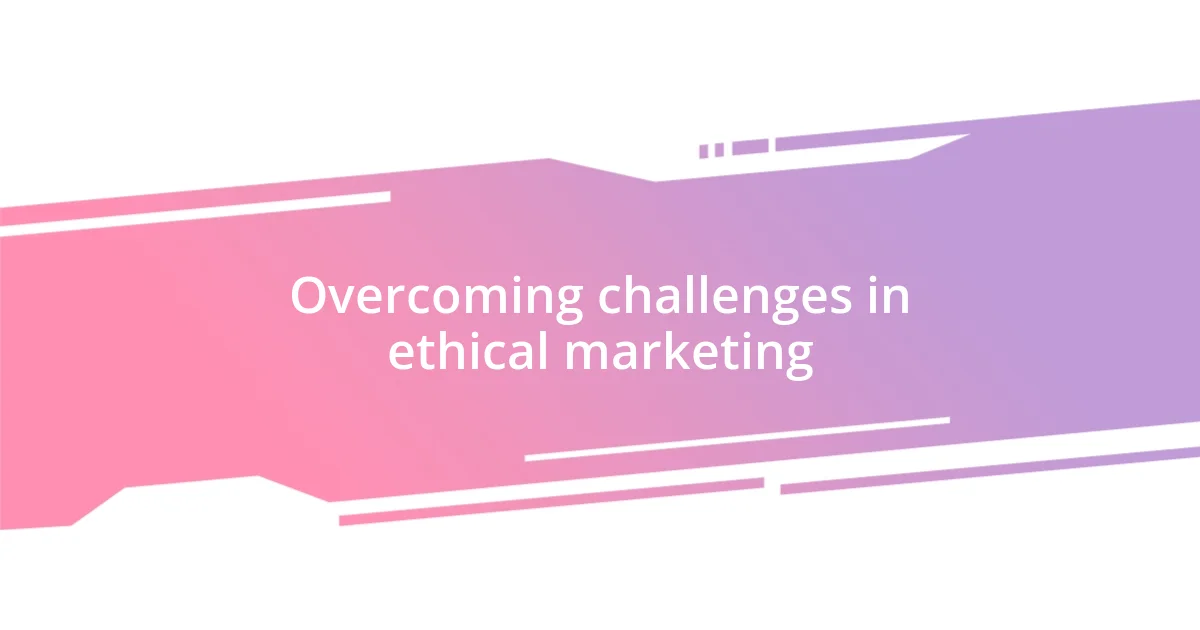
Overcoming challenges in ethical marketing
Navigating the complexities of ethical marketing can be quite a challenge. One hurdle I encountered was the pressure to conform to industry standards that often prioritize profit over principles. I remember discussing this with a marketing team; they felt torn between meeting sales targets and staying true to their values. It made me wonder, how do we strike that balance while staying authentic? I believe the answer lies in embracing a long-term vision—prioritizing relationships and trust over short-term gains.
Another issue I faced was the skepticism from consumers who have become accustomed to traditional marketing tactics. For example, when I tried to advocate for more transparent messaging in a campaign, some team members worried it might backfire. I shared my experience watching consumers react positively to brands that genuinely express their missions. It made me realize that honesty—even when it feels risky—can build profound connections. Isn’t it fascinating how transparency, rather than perfection, resonates with people?
Moreover, ensuring that ethical practices are consistently followed can be daunting. I’ve seen brands stumble when they voice values but fail to reflect them in their actions. I once attended a workshop where we discussed how a company faced backlash for contrasting social media posts. The lesson learned was invaluable: to truly overcome the challenges of ethical marketing, brands must integrate their values into every facet of their operations. Isn’t it powerful when actions and words align? That alignment not only reinforces credibility but also cultivates trust over time.














